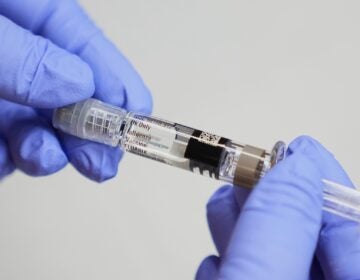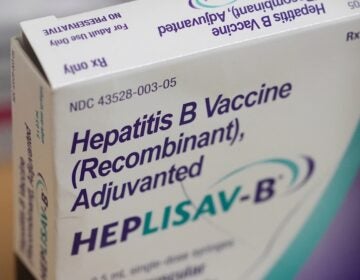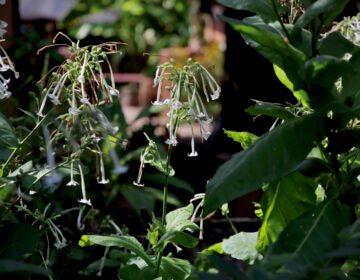Pregnant during a storm? Be ready, one Puerto Rico doc says
After an OB-GYN heard of unexpected home births post-Hurricane Maria, she is teaching her patients calm and self-reliance, just in case.
Listen 9:16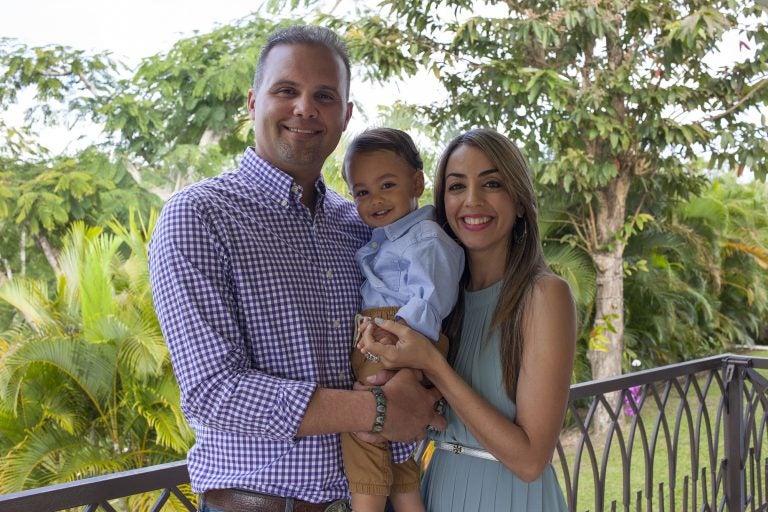
Raul Leandro was born at his grandmother’s house shortly after Hurricane Maria struck in September 2017. His parents, Raúl Malavé Cotto and Yahaira Molina Perez, planned to give birth at a hospital in San Juan, but when they showed up in early labor, they found the facility full of sand, without power, and attending only to emergencies. (Irina Zhorov/For WHYY)
Yahaira Molina Perez was eight months pregnant when Hurricane Maria hit Puerto Rico in September 2017. In her town of Cidra, downed trees and electric lines made roads impassable after the storm.
Molina’s due date wasn’t for weeks. She planned to deliver in a hospital in San Juan, about 45 minutes away — the storm cleanup would be done by then, she figured. But just in case, her husband, Raúl Malavé Cotto, who owns a landscaping business, started clearing debris with a front loader.
“So at least the hospitals would be accessible if an emergency occurred,” she said.
Five days after the storm, Molina started having contractions.
The trip to San Juan took twice as long as usual because the roads were such a mess. The hospital stood near the shore, and they found the facility full of sand and broken glass. The elevator was damaged, so she had to climb the stairs to the maternity ward. The facility was shrouded in darkness, and nurses rushed about with rolled-up pants and sleeves because the air conditioning had gone with the power.
The hospital was handling only emergencies, and Molina wasn’t quite ready to give birth. Unable to find lodging nearby to wait it out, she and her husband drove home to Cidra. There, they stopped at Molina’s mother’s house, where Molina’s water broke.
“I was thinking, ‘Wow, I did not prepare for this,’ ” she recalled. “I never even considered giving birth at home.”
There were no phones — no communication — but a doula they’d worked with lived nearby and she came over. Someone fetched a pediatrician cousin of Malavé’s. Through the grapevine, they heard an obstetrician lived in the neighborhood and knocked on his door. He brought his wife, a nurse.
Molina didn’t have her medical file on hand and couldn’t answer the assembled team’s questions about her pregnancy. Nearby, the emergency generator roared, another reminder of the chaos outside. It all made her anxious.
“I was yelling out of fear, I wasn’t yelling because of pain,” she said. “I yelled from fear.”
But this is a happy story. After a brief labor, Raúl Leandro was born healthy.
Now 1 ½, he squirmed in his father’s arms on a recent sunny day in Cidra, pointing into the lush jungle that grows just beyond the family’s hilltop house.
“Where’s the bobcat?” his father asked.
The bobcat in question was not a large cat, but the front loader Malavé had used to clear the roads after the storm. It’s her son’s favorite thing in the world, Molina says.
Preparing for the next storm
Obstetrician and gynecologist Carmen Zorrilla said she heard several stories about births like Raúl Leandro’s.
“It might seem like nothing,” she said. “But for these women, it was a stressful situation.”
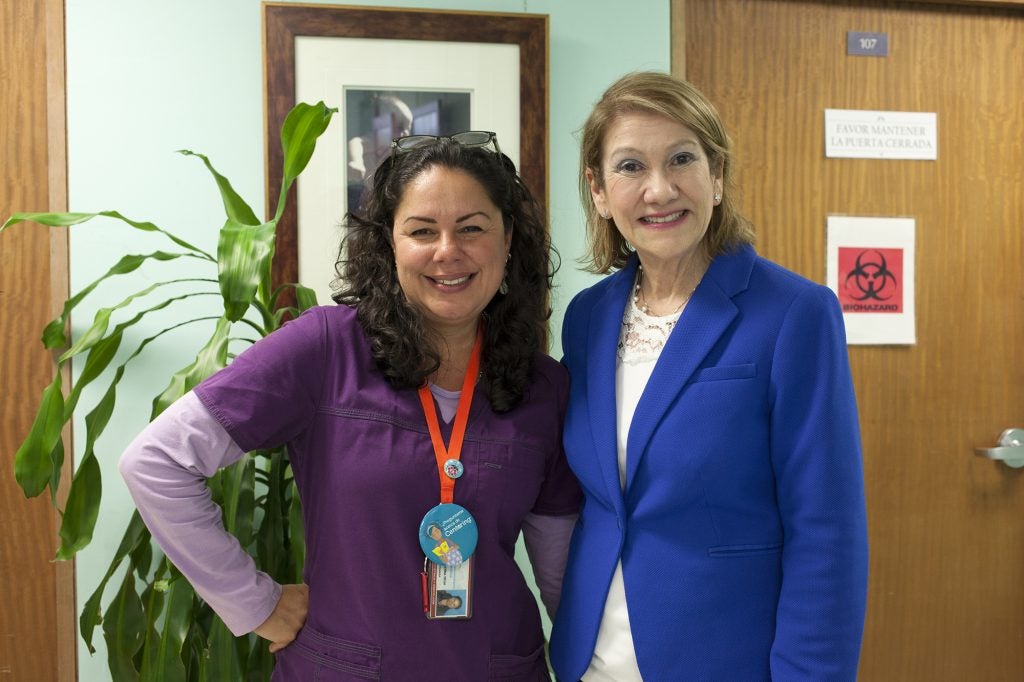
Zorrilla works at the main public hospital in San Juan and is the principal investigator at the Maternal-Infant Studies Center. About six years ago, for the first time in Puerto Rico, she introduced an untraditional approach to caring for women with risky pregnancies. The model, called “Centering Pregnancy,” relies on group prenatal appointments, rather than one-on-ones.
Hurricane Maria disrupted many things on the island, and the program was on hiatus, but Zorrilla is restarting the sessions and thinks they can be adapted to teach hurricane preparedness.
At a recent appointment, nine pregnant women — each with her partner, mother, friend, or other support person in tow — filed into a small room in the hospital. Before taking a seat, the women weighed themselves, measured their blood pressure with a monitor, and reported their results to a nurse.
“So they are taking care of their own health, right then,” Zorrilla said. “They are empowered, they are involved in their care.”
The session’s topic was common irritations during pregnancy. The facilitator, Dianca Sierra Vega, handed out cards, each with a different source of aggravation written on it. She told the women to act them out, charades-style.
With grunts, eye rolls, hobbles, and a lot of laughter, the women dramatized headaches, swollen feet, aching backs, constipation, and mood swings. After each round, Zorrilla explained the science of what was happening to their bodies. The atmosphere was informal, and the participants were engaged and friendly.
“That’s part of what they gain, and being part of a group, there’s social support,” Zorrilla said.
Initially, she introduced group appointments to Puerto Rico because the island has very high rates of babies born too early and underweight. Studies show that when moms participate in group appointments, more babies are born closer to their due dates and at healthier weights.
Zorilla thinks a combination of factors — the increased amount of time with a health care provider, the camaraderie that women going through similar experiences can provide, the empowerment around personal health — work together to reduce stress. Stress can hurt both moms and babies.
As this year’s storm season approaches in June, she’ll use the model to teach hurricane preparedness in new sessions.
The expectant mothers will discuss medical cases in which birth plans had to be thrown out the window. They’ll go over how to prepare for an unplanned home delivery, including basics like how to cut the cord and what supplies they should have on hand, such as clean towels, extra medication, and water. The women will practice calming breathing exercises. Each will receive a copy of her medical file, in case she finds herself delivering outside her regular hospital.
Most importantly, said Zorrilla, women will share their experiences during Hurricane Maria, allowing the groups to tap into community knowledge.
The idea is to give these mothers-to-be practical know-how as well as the confidence to stay calm if a storm barrels toward the island.
“The concept of group prenatal care is that you’re in control of your health and you take care of things, you do things to improve your health or maintain your health,” Zorrilla said. “And having the information of what to do with an emergency labor and delivery, I think it gives peace of mind.”
Centering Pregnancy sessions are built to be adaptable, said Marena Burnett, senior director of engagement and innovation with Centering Healthcare Institute, which developed the group-care model.
“It really should be adapted to meet the needs of the people in the community,” Burnett said. “Whether it’s disaster preparedness, or bringing in people from local resources or community resources.”
Zorrilla tweaked the session curriculum during the height of the island’s Zika epidemic. She put diagnosed women together in a group and worked to address their specific concerns, something she thinks helped the mothers cope.
Yaisha Roja is one of the women in Zorrilla’s current cohort. This is her second pregnancy, and she’s due in October — during hurricane season. She spent Hurricane Maria with her family “trying to stay calm,” and says she’s all in for more education.
“One should always take precautions,” Roja said. “Perhaps there’s a hurricane, and there aren’t many hospitals open, there’s traffic … that’s why this is important.”
Zorrilla does not support home births — she thinks they’re dangerous. But she acknowledged that even the hospitals struggled after Hurricane Maria. She was on duty in the labor room after the storm. There was no water, and she had only three sterile cesarean-section kits.
“Because of the experiences with Maria … the experience was ingrained into our psyche, and I say that we have community PTSD,” Zorrilla said. “Now that we lived not just a hurricane but the aftermath — the complete disruption of the power grid — everybody is concerned, and now we know that we need to be ready for this.”
WHYY is your source for fact-based, in-depth journalism and information. As a nonprofit organization, we rely on financial support from readers like you. Please give today.




